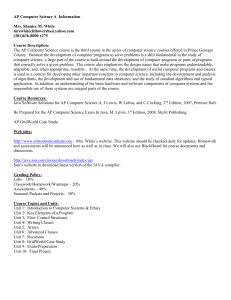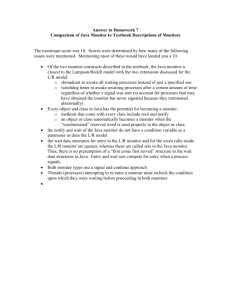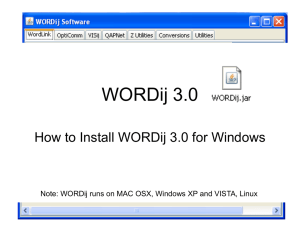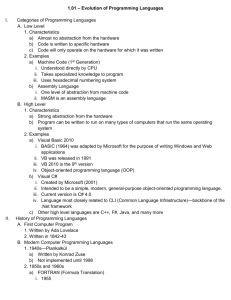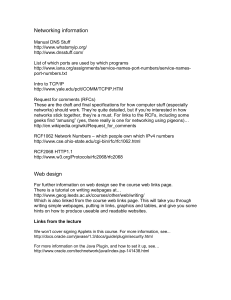Object-oriented Programming with Java 1
advertisement
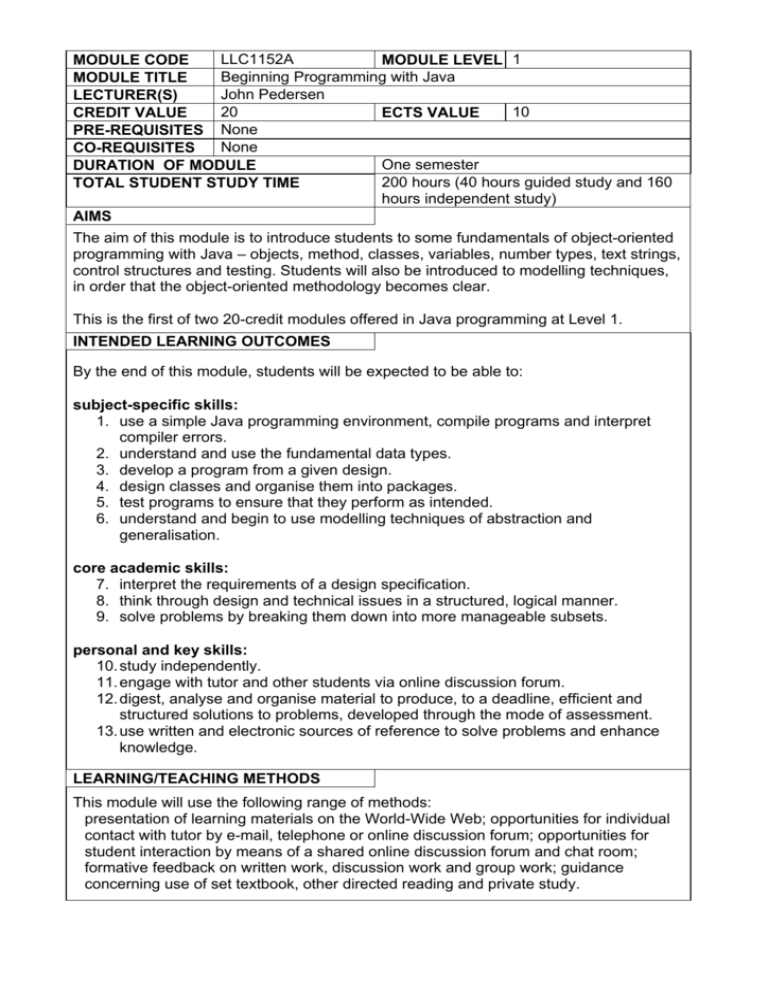
LLC1152A MODULE CODE MODULE LEVEL 1 Beginning Programming with Java MODULE TITLE John Pedersen LECTURER(S) 20 10 CREDIT VALUE ECTS VALUE PRE-REQUISITES None None CO-REQUISITES One semester DURATION OF MODULE 200 hours (40 hours guided study and 160 TOTAL STUDENT STUDY TIME hours independent study) AIMS The aim of this module is to introduce students to some fundamentals of object-oriented programming with Java – objects, method, classes, variables, number types, text strings, control structures and testing. Students will also be introduced to modelling techniques, in order that the object-oriented methodology becomes clear. This is the first of two 20-credit modules offered in Java programming at Level 1. INTENDED LEARNING OUTCOMES By the end of this module, students will be expected to be able to: subject-specific skills: 1. use a simple Java programming environment, compile programs and interpret compiler errors. 2. understand and use the fundamental data types. 3. develop a program from a given design. 4. design classes and organise them into packages. 5. test programs to ensure that they perform as intended. 6. understand and begin to use modelling techniques of abstraction and generalisation. core academic skills: 7. interpret the requirements of a design specification. 8. think through design and technical issues in a structured, logical manner. 9. solve problems by breaking them down into more manageable subsets. personal and key skills: 10. study independently. 11. engage with tutor and other students via online discussion forum. 12. digest, analyse and organise material to produce, to a deadline, efficient and structured solutions to problems, developed through the mode of assessment. 13. use written and electronic sources of reference to solve problems and enhance knowledge. LEARNING/TEACHING METHODS This module will use the following range of methods: presentation of learning materials on the World-Wide Web; opportunities for individual contact with tutor by e-mail, telephone or online discussion forum; opportunities for student interaction by means of a shared online discussion forum and chat room; formative feedback on written work, discussion work and group work; guidance concerning use of set textbook, other directed reading and private study. ASSIGNMENTS • • Short answer questions and problem-solving exercises (equivalent to 1600-2400 word essay) (ILOs 1-3, 7-13) Programming assignment (equivalent to 2400-3600 word essay (ILOs 1-13) ASSESSMENT • • Short answer questions and problem-solving exercises (equivalent to 1600-2400 word essay) (ILOs 1-3, 7-13), to count for 40% of the final mark. Programming assignment (equivalent to 2400-3600 word essay) (ILOs 1-13), to count for 60% of the final mark. SYLLABUS PLAN • • • • • • • • • Setting up a computer for Java programming. Programming in general perspective Objects and classes. Data types. Simple graphics. Decisions. Iteration. Designing objects. Testing INDICATIVE BASIC READING LIST Arnow, D. & Weiss, G. (2000) Introduction to programming using Java: an object-oriented approach, Harlow: Addison Wesley Barker, J. (2000) Beginning Java Objects: From Concepts to Code, Berkeley: Apress. Barnes, D J & Kolling, M (2002) Objects First with Java: A Practical Introduction Using BlueJ, London: Prentice Hall International. Eckel, B. (2002) Thinking in Java, London : Prentice Hall International (also online at http://www.mindview.net/Books/TIJ/). Horstmann, C. ( 2002 ) Big Java, New York: Wiley. Java for Students - http://www.javaforstudents.co.uk/ Kamin, N. et al (1998) An introduction to computer science using Java, London: McGraw Hill. Morelli, R. (2002) Java, Java, Java: object-oriented problem solving, 2nd Edition London: Prentice-Hall International
